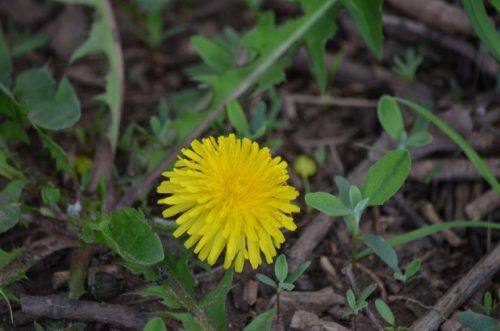Chemical fertilizers offer several benefits, but being environmentally friendly isn’t one of the benefits. Moreover, chemical fertilizers take a large chunk out of your lawn care budget.
You have other options that include organic fertilizers. From seaweed to dog food, you can produce a vibrant lawn and still have money left over for other landscaping jobs. Even urine works as an organic fertilizer, although we discourage readers from urinating on their lawns!
Let us review the benefits of organic fertilizers:
- Improves Soil Fertility
- Much Lower Investment
- Applied by Homeowners
- Environmentally Friendly
- Produces Non-Toxic Grass
 Did you know the ugly weeds that invade your lawn provide one of the most effective organic fertilizers? You don’t need a PhD in landscaping to create your own fertilizer with weeds.
Did you know the ugly weeds that invade your lawn provide one of the most effective organic fertilizers? You don’t need a PhD in landscaping to create your own fertilizer with weeds.
How to Create Your Own Fertilizer with Weeds
Weeds provide a rich source of nitrogen and don’t deprive your grass and plants of the nitrogen needed to flourish. Comfey, nettles, horsetail, burdock, chickweed, and yellow dock all contribute to fertilize your lawn organically. Even better, weeds grow under your feet. You don’t have to wait for the urge to go for enjoying the benefits of urine fertilizer.
Several Ways to Create Weed Fertilizers
You have several options for creating your own weed fertilizer recipe. If the weeds you acquire have not yet flowered, dry the weeds under the sun and then finely chop the weeds to use as mulch in a compost pile. Some gardening experts recommend drying the entire weed first, while others maintain chopping and then drying weeds extracts more nitrogen. You can also soak weeds for more than two weeks by placing weed roots and leaves inside of a five-gallon bucket. Push the weeds deep within the water to ensure complete coverage. After two weeks, you should have a thick substance to dilute at one part soil drench fertilizer to 10 parts weed fertilizer. Punch two holes on the bottom of the five-gallon bucket and allow the thick substance to spread over your lawn. This procedure takes time, and you might need to cover your nose and mouth due to the stench of the gooey substance.
Why Add Weeds to Compost?
Why should you add weeds to compost, instead of applying weed fertilizers directly to the grass? The answer lies in the partially decayed composition of compost, which produces a much lower volume for spreading. Compost possesses a very high level of microorganisms that the soil needs to aerate and grass requires for nutrients. Grass absorbs concentrated compost much quicker than it absorbs weed fertilizers. The only downside is the time it takes to create a large compost pile.
.


